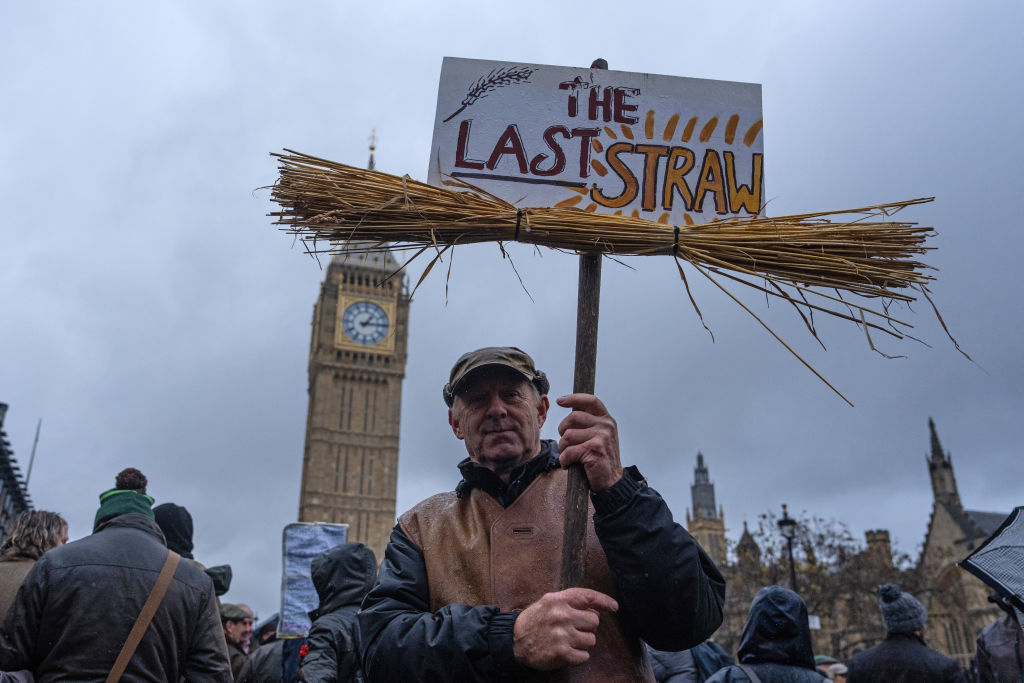Westminster, London
In recent years, Whitehall has found itself as the designated trauma zone for Britain’s discord. Forever protests paralyse the centre of government usually to little avail, attended to by jaded policemen and viral influencers looking to stoke tribal frenzies online. For anyone familiar with such protests, the descent of tens of thousands of farmers into the capital today to protest against the government’s new inheritance tax on agricultural estates felt like a distinctly different flavour of protest for the Starmer era.
Contrary to its reception on social media by wonks and commentators, the concerns of those gathered in Westminster went beyond just one tax. Here was a protest about a bigger existential crisis facing the countryside that reaches back decades. The remonstrances of this rural populism were broad: rewilding subsidies gobbled up by the National Trust, predatory corporate supermarkets, farms ravaged by unsolved crime and burglary, stagnant wages. A visceral sense of unfairness that pervades the yeomanry and petit bourgeoisie of the shires.
The demographic of the protest alone spoke to these material concerns far removed from warring narratives in the media: big families visiting London for the first time in years, fourth generation farms facing extinction, those employed in the wider rural economy living paycheck to paycheck. Though there was hand-wringing on social media over footage of a tractor breaking through a barrier, the mood was peaceful and stoic: a two-minute silence by the cenotaph, an amateurish charm to the signs, speeches and proceedings.
Many had never attended a protest, nor been to London in years. And when charged with the futility of their cause (the Government as yet shows no sign of backing off) there was not resignation but quiet anger. One young farmer from Devon, holding a Reform banner, carefully worded the prospect of a French style revolt involving rogue tractors, blockades and manure sprayed on government buildings. “So far we’ve been peaceful but we can’t rule out more European style tactics if this carries on.”
Attempting to speak on behalf of this mood was a strange mix of celebrities and attendant politicians. Ed Davey and Kemi Badenoch spoke to the crowd. Jeremy Clarkson had a hostile interview with the BBC’s Victoria Derbyshire over the Chancellor’s line that it was a crackdown on wealthy landowners to pay for the NHS. But it was Andrew Lloyd Webber who bluntly captured the mood, describing an undeniable concern among the crowd that foreign capital and big agribusiness were lying in wait: “The farms will all be bought by foreigners, outsiders, people who are not buying it for the love of the countryside,” he told GB News.
This mood came armed with facts and a deeper sense of paranoia. Above all the Government’s bungling assessment of the impact: Defra estimates that 66% of farms will be impacted, while the Treasury put its half that amount. There is a sense no one knows what the impact will be, with many arguing the £1 million cap is a comic underappreciation of the combined value of land and assets on small farms. Ulterior motives were suspected, with frequent angry mentions of the Labour advisor John McTernan who had previously said that “It’s an industry we could do without. We don’t need small farmers.”
“This is great, these are our people,” said a spritely Robert Jenrick walking back towards Parliament Square. When pointed to the ambient support for a lurking Reform presence (Rupert Lowe and Richard Tice had been seen holding court with young men in Barbours), he spoke explicitly of the need to recapture the spirit of provincial England: the hardworking families who work to pass on an inheritance.
But the mood arguably goes beyond the electoral targets of CCHQ. This was a broader coalition of the shire aggrieved by a sense of injustice at the hands of an already historically unpopular government regarded in terms of deceit, incompetence and spiteful motivation. Unusually for a ruddy faced mass of tweed and waxed jackets, these protests were a vector for a broader public mood. And with this came a sense that this time the public were more receptive to the cause. “As a farmer” said one elderly gentleman from Northampton, awed by the size of the crowds, “I don’t think I’ve ever seen such popular support for the countryside”.











Join the discussion
Join like minded readers that support our journalism by becoming a paid subscriber
To join the discussion in the comments, become a paid subscriber.
Join like minded readers that support our journalism, read unlimited articles and enjoy other subscriber-only benefits.
Subscribe